The making of Doug Burgum: From small town North Dakota to Trump's possible VP
ARTHUR, N.D. ― It was the early 1990s, and Doug Burgum had a message to deliver to partners of Great Plains Software gathered at the "Stampede to Fargo" conference.
Burgum, then CEO of the startup accounting software company, took the microphone and apologized for a flaw discovered in a new product set to go on the market ? and to prove his sincerity, he pulled out a raw egg and slammed it on his head.
"I have egg on my face. We have egg on our face. And we will make this right," Burgum told the hundreds of attendees, according to Tami Reller, who first started working with Burgum as a receptionist at Great Plains before rising up the ranks to become the company's chief financial officer.
Egg remnants remained on Burgum as he took questions from partners in the room for the next two and a half hours.
The anecdote illustrates a no-nonsense, personal and deeply earnest approach to business and politics that Burgum's admirers say helped catapult him from software executive to North Dakota's Republican governor, and now onto former President Donald Trump's short list to be his vice presidential running-mate.
"The more you know him, the more you appreciate what he brings ? and what you see is what you get," Reller said.
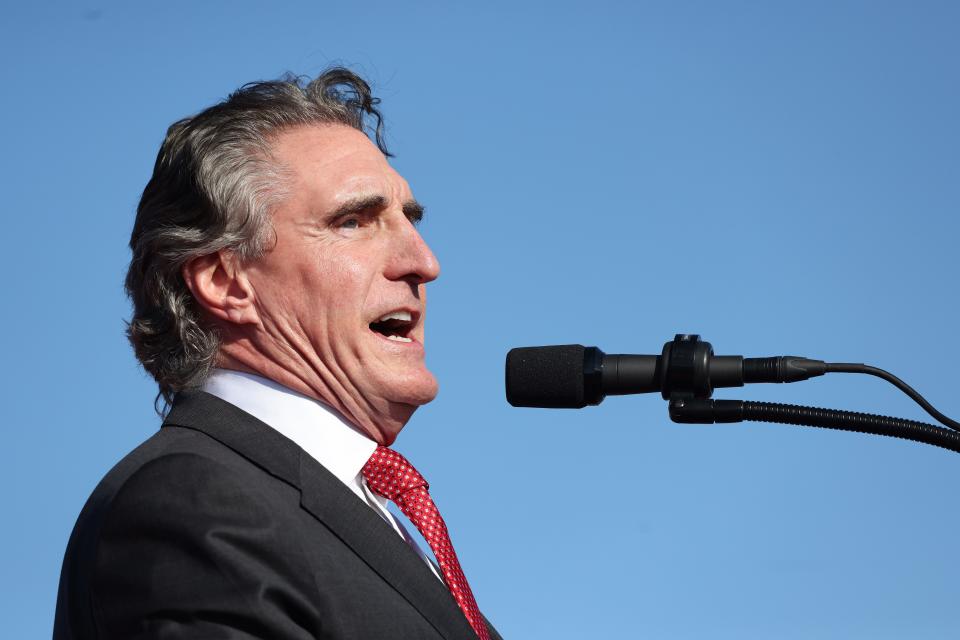
Yet to some who have followed his career, the current picture of Burgum as a staunch defender of Trump runs counter to the Burgum they knew: a businessman they considered independent-minded, less interested in partisan politics, and unafraid to butt heads with the right flank of his party as governor.
"He's always thought for himself. Always. Didn't matter what it was," said Paul Lako, 56, who resides in Burgum's hometown of Arthur, North Dakota, population 325. "If it was Doug, he did things his way. He was good at it. And it seems to me now, he's kind of just changing his ways a little bit so he fits in."
USA TODAY spoke to more than two dozen North Dakotans ? including Burgum business associates, Republican and Democratic state lawmakers, family members, friends, and both longtime supporters and critics ? to learn more about a figure who has burst onto the national scene as he's ascended up Trump's VP leaderboard. Burgum declined to be interviewed.
Allies of Burgum ? who was known to sometimes keep his hair in a pony tail in the 1980s and wear white tennis shoes with suits before it was cool ? described a policy wonk obsessed with detail, who listens attentively to others, effortlessly absorbs new information, thinks outside the box, articulates a vision, and can speak the language of farmers in North Dakota as easily as he can converse with executives in Silicon Valley.
Burgum is big on accountability and humility, they said. Republican state lawmakers in North Dakota said it's not unusual to get a phone call approaching midnight from the governor about the biggest issues brewing at the statehouse.
"It sounds cliché, but you can't spend 20 minutes around him and not immediately recognize that this is a problem-solving, solution-oriented, determined, bright, capable person," said Drew Wrigley, North Dakota's Republican attorney general.
But others, like Jim Fuglie, former executive director of the North Dakota Democratic-NPL Party, who runs a popular North Dakota political blog, said the Burgum who he crossed party lines to back for governor in 2016 isn't the same Burgum making the rounds on cable news today.
"He was pretty independent of the Republican Party for a good long while when he was first governor," said Fuglie, former state tourism director in North Dakota. "And so it's been a little bit of a surprise, I think, to a lot of North Dakotans to see him go so deep into the Trump world."

Why is Trump looking so closely at Burgum?
Burgum's strengths that shined locally and in the tech world failed to generate much buzz during his short-lived long-shot presidential campaign last year in the Republican primary. Burgum dropped out before voting began and struggled for airtime during televised debates. He's perhaps best remembered for battling through an Achilles tear he suffered during a pick-up basketball game with campaign staff to take part in one of the debates the next day.
Now, Burgum is having his moment.
The 67-year-old checks many boxes off that Trump is looking for as a potential vice president. And Trump has shown a fondness for the second-term governor who became a Microsoft executive after selling Great Plains in 2001 to Microsoft for $1.1 billion in stock.
Attractive, telegenic with thick, full hair, Burgum looks the part as vice president, Trump is convinced, according to those close to him. Trump appreciates Burgum's strong public-speaking ability, his money and his expertise in energy and fossil fuel issues, an area in which Burgum has become an adviser to the presumptive GOP presidential nominee.
Other Republicans in Trump's VP hunt include Sens. Marco Rubio of Florida, Tim Scott of South Carolina and J.D. Vance of Ohio.
A year ago, Burgum said on NBC's "Meet the Press" that he wouldn't do business with Trump. "I just think that it’s important that you’re judged by the company you keep," he said last July. But now Burgum has turned into one of Trump's go-to surrogates, taking the stage with the former president at rallies and attacking President Joe Biden on cable television appearances.
"This guy is tireless, he's committed, he's smart, he's funny. He's nothing like he's portrayed in the press," Burgum, discussing Trump, told Fox News this month. "If you asked me that same question today, I'd be like, 'Absolutely, I'd do business with him.'"
More: Will Donald Trump choose Doug Burgum as his running mate? Website fuels VP speculation
Burgum in May traveled to a New York courthouse in a show of support for Trump during the former president's hush-money trial. Burgum was among several VP contenders in Atlanta for Thursday's presidential debate between Trump and Biden.
On the campaign trail for Trump, Burgum has drawn criticism from Democrats for saying Americans are "living under a dictatorship" with Biden. He has pointed to federal environmental regulations in the energy sector and Biden's executive action on immigration and student loan debt. (Trump actually took far more executive actions as president than Biden ? 220 executive orders to Biden's 139.)
"Those are the things that authoritarians and dictators do: They don't follow our democratic processes and they just assert their own liberal view, and that's what the Biden administration is doing," Burgum said last week.
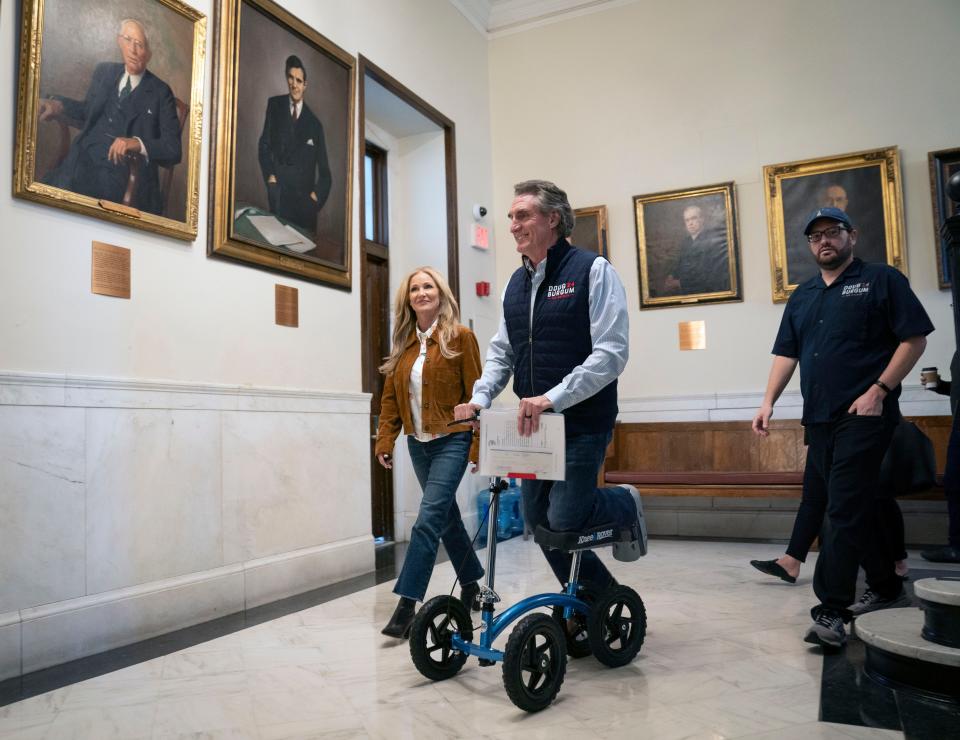
North Dakota US senator believes Burgum is one of two final candidates
Trump's consideration of Burgum has put a rare spotlight on North Dakota, the country's fourth least populated state ? rural, deeply conservative and once an unlikely place to produce a major party running-mate.
"You think about, well, what does a middle-age white man (like Burgum) from a state with three electoral votes that hasn't gone Democrat since Lyndon Baines Johnson bring to the ticket?" U.S. Sen. Kevin Cramer, R-N.D., said. "And then you see it playing out the way I think it's playing out, and I think him and Tim Scott are the frontrunners. In fact, I'd be surprised if it isn't one of the two of them."
If Trump were to choose Burgum as his vice president nominee, it wouldn't be the first time he's opted for a governor of a Republican-dominant state. Trump chose Mike Pence, the former congressman and Indiana governor, as his running-mate in 2016, rejecting any calculus that a vice president should come from a swing state.
Similar to Pence, Burgum has a mild-mannered temperament in total contrast to the flame-throwing Trump. Some observers have speculated that Trump might prefer an understated vice president, like Burgum, who would rarely draw more attention than the president.
"You start seeing as well as (Burgum) plays out in the marketplace," Cramer said, "and the stability he sort of brings to the messaging, particularly on economic issues and energy issues, and you think, well, this really could happen. I see all the value in the world to him being on the ticket."

North Dakota's senior Republican U.S. senator, John Hoeven, is also firmly in Burgum's corner. And if he's not named Trump's vice presidential nominee, Burgum supporters believe he's a prime candidate for Energy or Commerce secretary.
Hoeven, a former governor of North Dakota, said he lobbied for Burgum when Trump visited the U.S. Capitol on June 13 for the first time since leaving the White House.
"I think Doug's in the hunt. But I think if he doesn't get the VP, I think he will be in the Cabinet. I really do," Hoeven said. "But nobody knows but President Trump."
Hoeven said Burgum's ability to deliver the former president's message has impressed Trump. "And if you watch him, as he's continued to do it, he gets better and better at it. Some people say, 'Oh he can be a little wonky or maybe even go on into too much detail.' It's in part just because he's really intelligent and he knows this stuff."
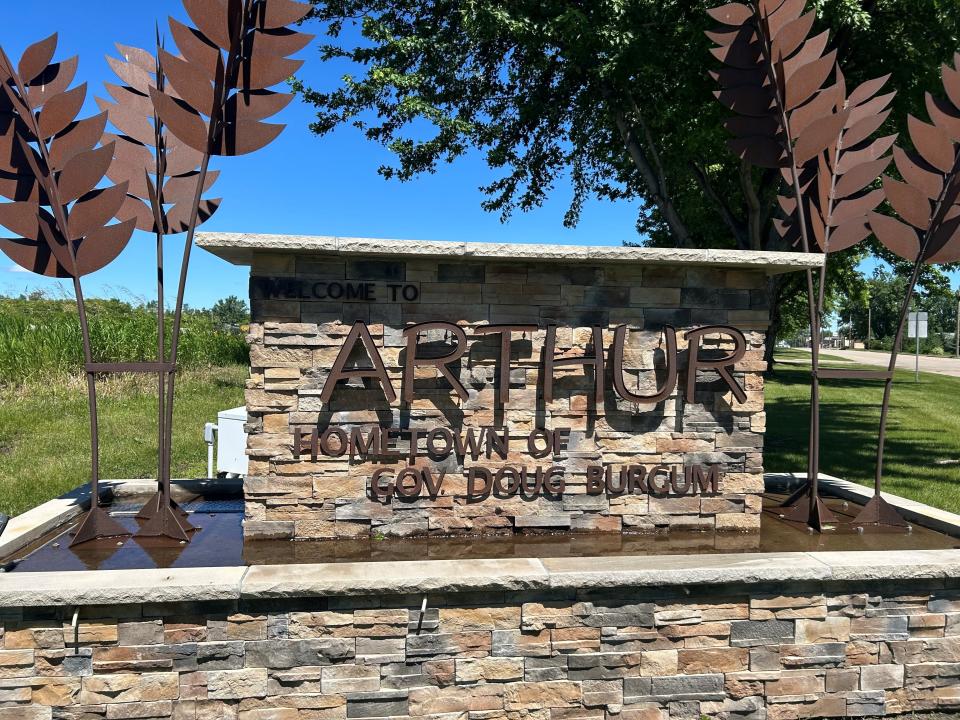
Big ideas as a kid in Arthur
A Trump pick of Burgum would mark quite a rise for a governor born and raised in tiny Arthur, situated about 40 miles northwest of Fargo, North Dakota. The farm town stretches about 16 blocks, comprised mostly of modest single-family homes, and a small collection of shops on Main Street. Mary's Market ? a grocery that doubles as a quilt shop ? Kelly's Café and a sports bar called Coaches Corner are among the biggest local draws.
Across the street is the town's most striking feature: a soaring grain elevator, operated by the Burgum family since 1906, and other elevators built later. Today, it's owned by Arthur Companies, Inc., led by Burgum's relatives.
The Burgums, who settled in Arthur in the 1880s, are central to the city's story and survival. Burgum's grandfather, J.A. Burgum, was Arthur's mayor from 1921 to 1923. In addition to the Burgum farm and grain elevator, the family operated a mercantile, had stake in the local bank and helped build its racquetball facility.

"The Burgum family has been excellent to the town," said Lako, who owns an excavating company in Arthur and is among Burgum's many hometown fans. "They're the reason that this town is still here and flourishing."
"They're the money in town," Audrey Doyle, 78, a self-described Democrat who voted for Burgum as governor, said as she enjoyed recent 70-degree weather in the backyard of Hillside Apartments with her friend Bonnie Zieske.
"Wouldn't that be nice to have a vice president from Arthur?" Ziekse, 76, said with a laugh. "It would be pretty neat."
Burgum's childhood home, a red, ranch-style home across from St. John Lutheran Church, still sits at the corner of 1st Street and 3rd Avenue.
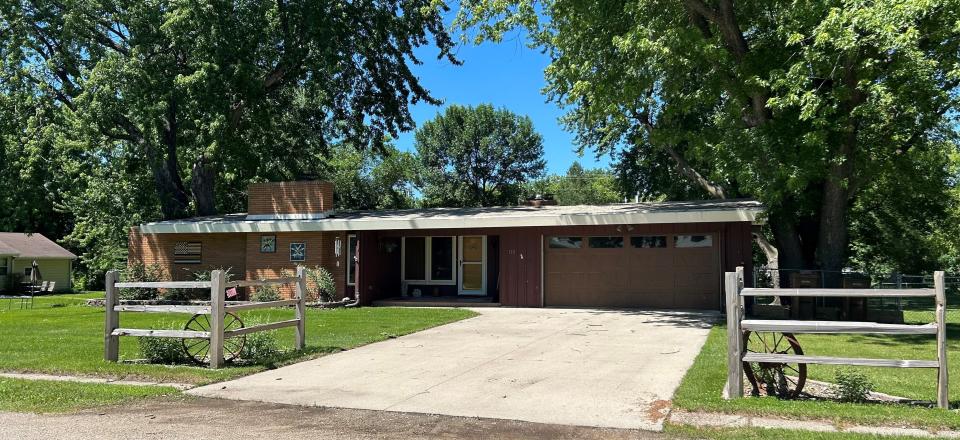
Shirley Nedrebo, 88, lived across the street from Burgum's home and attended Arthur United Method Church with the Burgum family. She remembers when Doug was born and said he displayed an entrepreneurial streak at an early age.
"He had ideas that were just out of this world," Nedrebo said, recalling a young Burgum, probably six or seven years old, starting his own makeshift newspaper with help from his parents to print off the paper. "He would go around town and sell subscriptions to the newspaper. My mom bought one. This is just what a little kid did."
Burgum competed in football, basketball and track and field in high school, and played in the band, according to Tom Iwen of Arthur, a classmate and friend of Burgum. He said Burgum was popular and got along with about everyone.
"He was energetic, kind, never picked on people or anything like that," Iwen said, recalling Burgum's confidence showing through as a kid. "He can get up and talk about anything in front of anybody."
"He had a great imagination," said Kevin Skunes, another classmate, who used to stay at Burgum's house in Arthur when storms prevented him from getting back to his house further out in the country. "He really wanted to be the best he could be at everything."
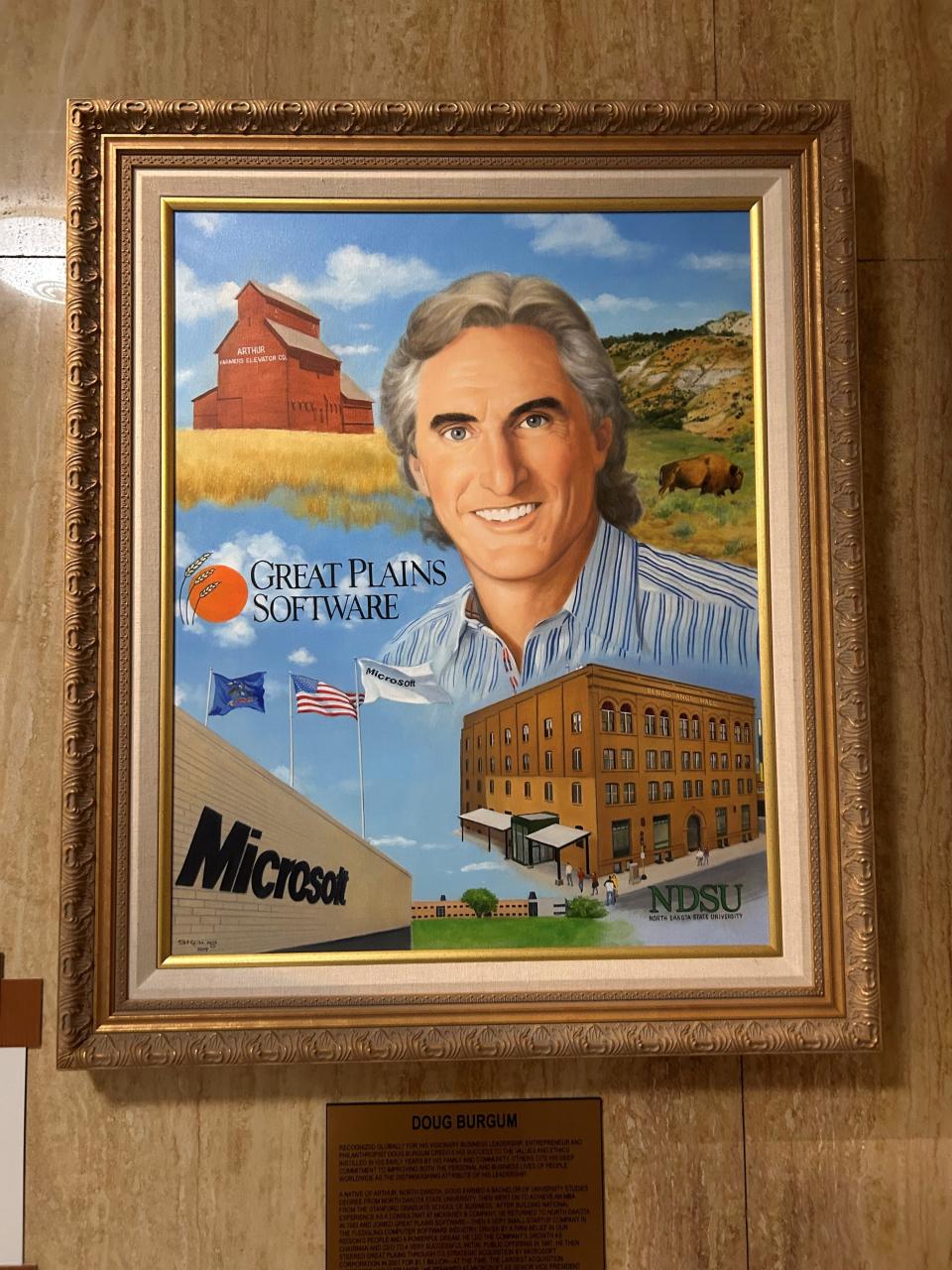
Selling the farm for the tech world
After high school, Burgum attended North Dakota State University, starting a chimney-sweeping business as a student, and later enrolled at the Stanford Graduate School of Business.
Then, in 1983, he bet the family farm ? mortgaging 160 acres of farmland he inherited for seed money to invest $250,000 in the software company Great Plains. Burgum later sold the company to Microsoft in 2001, a move that made him Microsoft's senior vice president until 2007.
At the time, Microsoft was led by Steve Ballmer, a Stanford classmate of Burgum. The accounting software operation at Great Plains evolved into Microsoft Business Solutions, which Burgum managed.
Today, Burgum's net worth is valued at more than $100 million, according to Forbes magazine, making him one of the richest governors in the country but far from billionaire status. As part of the Microsoft acquisition of Great Plains, Forbes reported that Burgum received more than 1.7 million Microsoft shares, then worth about $100 million.
Reller, who was the 36th employee hired at Great Plaines, later worked alongside Burgum as executive vice president of marketing at Microsoft. She said Burgum was approachable, easy to talk to, a great listener and both eager to help while holding his employees to a high standard.
"It always felt like he had our back," Reller said, crediting Burgum's work culture for the company's minimal employee turnover. "That leadership package is what compelled so many of us to be a part of (Great Plains) for a very long time and, frankly, could not imagine leaving."
On the road while at Great Plains, Burgum snapped photos with every potential investor he met so he would remember them the next time. During the company's annual "Stampede to Fargo" conferences with investors, Burgum often started remarks with a history lesson. One time it was on the exploration of Lewis and Clark. Another year he told the story of New Zealand explorer Edmund Hillary. He would then engage in long question-and-answer sessions with investors that Reller described as "iconic."
Some in the budding tech industry in the 1980s and 1990s saw Fargo-based Great Plains as an underdog stacked against bigger markets. But Reller said Burgum saw the company's Midwest roots as a strength, allowing it to pull top talent from the region. Today, Microsoft still operates a Fargo campus. "He was never irritated by it," Reller said of the outside perceptions. "He was just always patient in describing our competitive advantage."
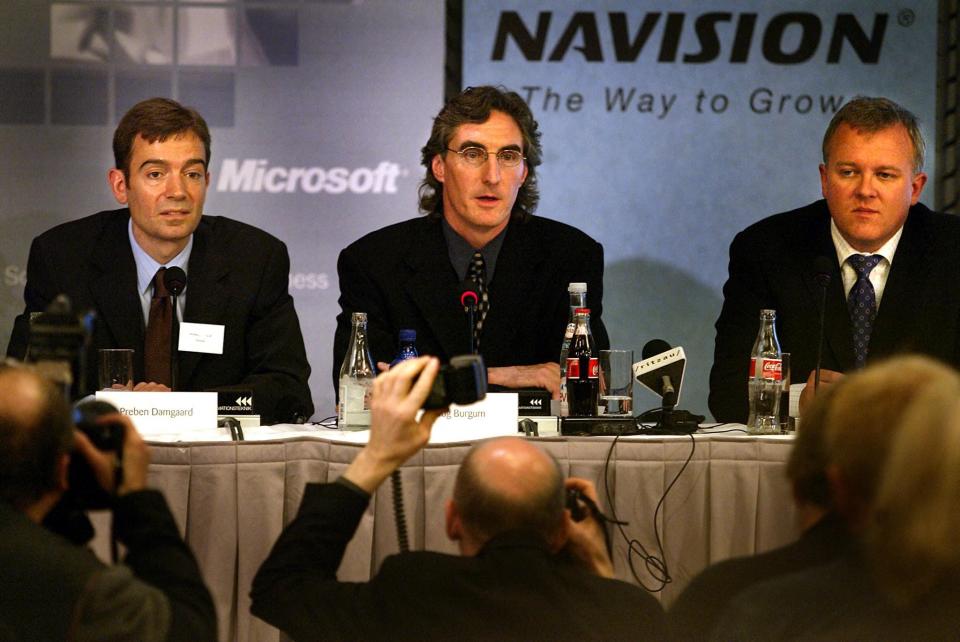
Burgum campaigned for governor on ending North Dakota's "good old boys club" in his first election in 2016.
With the help of his personal fortunate, he erased a massive polling lead in the Republican primary held by Wayne Stenehjem, a former North Dakota attorney general and state senator who was endorsed by the state's Republican Party. Burgum secured the Republican nomination by 20 percentage points and easily won the general election to become North Dakota's 33rd governor.
Critics from the right and left
In Bismarck, North Dakota's capital, Burgum pushed cuts to income and property taxes and overhauled North Dakota's pension plan for public employees. He launched a "red tape reduction" working group to cut government waste. He's credited with helping secure the future Theodore Roosevelt Presidential Library set to open in 2026 in Medora, North Dakota.
Burgum has also supported the state's oil and gas industry, defending the controversial Dakota Access Pipeline and helping protect a major coal-fired power plant in North Dakota from shutting down? while at the same time signing a pledge to make the state carbon-neutral by 2030.
"He came in to state government as somebody who was widely respected in the software industry, but he's now well regarded in the energy industry as well," said North Dakota Senate Majority Leader David Hogue. "And that's because he's self-taught, he's initiated, and he's got this unquenchable curiosity that drives him to always be learning and looking."
Burgum has three adult children and has been married twice. In 2016, he married Kathryn Burgum, the state's first lady, who has openly discussed her battle with alcoholism to bring awareness to addiction.

Rep. Mike Lefor, the Republican leader in the North Dakota House of Representatives, said Burgum has a "photographic memory" and a "strategic mind" and has generally gotten along with the Republican-supermajority legislature. "The legislative branch and executive branch ? there's natural tension on occasion. But we've worked very well, even on times we don't agree. He's not a disagreeable person," Lefor said.
Much of the pushback Burgum has received as governor came from the far-right of his party in the legislature ? a group that calls itself the Bastiat Caucus and considers itself the North Dakota version of the House Freedom Caucus in Congress.
Rick Becker, a former North Dakota state representative who led the caucus, criticized Burgum for supporting government subsidies for corporations, increasing government spending, and supporting restrictions during the COVID-19 pandemic.

"I don't think, philosophically, he's in the camp of Republicans or Democrats. He is a technocrat," said Becker, who lost a Republican primary race to Julie Fedorchak this month for North Dakota's lone congressional seat. The state's outgoing congressman, Rep. Kelly Armstrong, won the Republican nomination for governor to replace Burgum, defeating Burgum-backed Lt. Gov. Tammy Miller. Armstrong was endorsed by Trump.
"If Trump chooses Burgum for VP, I'm not sure what his angle is," said Becker, an RNC convention delegate and Trump supporter. "President Trump has made some personnel mistakes in the past. With this choice, I hope it's not another one. The conservatives in our state, we are all saying the same thing: We just don't get it."
From the opposite side of the political spectrum, Democrats argue Burgum has shifted to the right to curry favor with Trump. Tim Purdon, a former U.S. attorney in North Dakota appointed by President Barack Obama, said he broke party ranks to vote for Burgum in 2016 because he saw the Republican as a "moderate, reasonable guy."
"I thought for six years, he sort of governed like that person," Purdon said, pointing to Burgum's efforts to improve relations with North Dakota's native American tribes and applauding the governor's vetoes in 2021 of Republican-backed legislation that took aim at transgender youth in school sports and another bill seeking to block the state from mandating face coverings during the pandemic.
"But he has positioned himself in his run for president, and now his attempt to become the vice president, as the Trumpiest Trumper whoever Trumped," Purdon said. "Does Doug Burgum believe that the election was stolen and that Donald Trump is truly the greatest president in American history?
"Does he believe that or is he just saying that to gain power? I don't know, but I'll tell you this: I don't know which one of those is worse."
Burgum has found himself, allies say
North Dakota Rep. Zac Ista, the Democratic leader in the House, said Burgum hasn't stood up to the "extreme voices within his own party," citing his signature last year of a bill banning most abortions, except in the case of rape or incest during the first six weeks of presidency.
"I think you'd be hard-pressed to find anyone from any party of the state that believes Doug Burgum is authentically a Trump-like Republican," Ista said. "But the question I keep coming back to is, after a while, you become that which you are pretending to be. So the more the governor is out on the national stage stumping for a now-convicted felon, the more I guess he's revealing his true character."
Republican allies of Burgum reject such assessments.
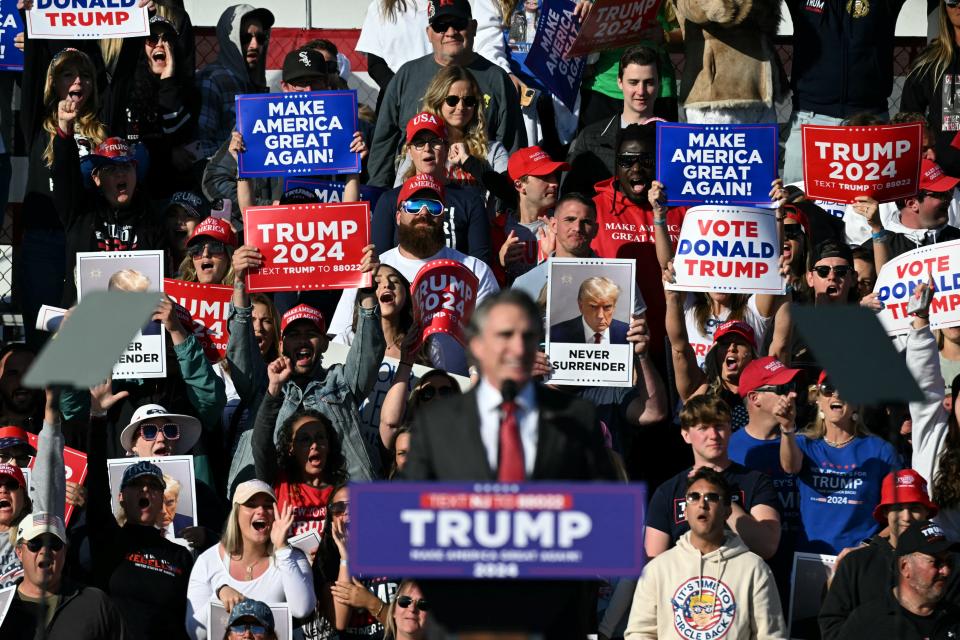
"My colleagues and I have been talking about this. The Doug Burgum we've seen for the last couple months is the Doug Burgum that we all know and have worked with," said North Dakota state Rep. Mike Nathe of Bismarck. He said Burgum seemed rushed during public appearances as a presidential candidate, but the last few weeks "has been himself all the way: very thoughtful, very smart, right on point."
As for Burgum's past criticism of Trump, Nathe said he believes Burgum has gotten to know Trump a lot better since then. "That shows the flexibility of Gov. Burgum. He's willing to work with people, and I don't have a problem with it," Nathe said.
Meanwhile, Iwen and other Dakota High School classmates of Burgum, class of 1974, are holding a 50th reunion in Arthur on July 27. They scheduled festivities after the Republican National Convention, set for July 15-18 in Milwaukee, with Burgum in mind.
"Hopefully he's there," Iwen said. "We set it around his schedule."
Contributing: David Jackson. Reach Joey Garrison on X @joeygarrison.
This article originally appeared on USA TODAY: The making of Doug Burgum: From North Dakota to Trump's possible VP
